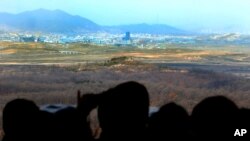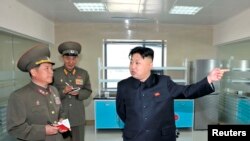South Korea is offering to hold official talks with North Korea over the fate of their only remaining joint venture project, which has been suspended since earlier this month. The North has little time to respond, and the offer is unlikely to lead to an agreement.
The cabinet ministry in the South responsible for dealing with the North has put forward a proposal for dialogue on the Kaesong industrial complex, but on the condition it be accepted by noon Friday.
Unification Ministry spokesman Kim Hyung-seok tells reporters at a hastily called media briefing that the situation at the Kaesong industrial complex, just north of the demilitarized zone, cannot continue as it is. Thus, he says, the Ministry is proposing formal direct talks to achieve a breakthrough.
Analysts say the deadline of little more than 24 hours for North Korea to respond is likely to infuriate officials there, something officials in the South certainly realize.
Professor Kim Yong-hyun specializes in North Korean studies at Dongguk University in Seoul.
The professor says it will be difficult for North Korea to immediately respond to the South Korean offer of talks. And the condition of “significant measures” to be taken by Seoul if there is no quick and positive reply raises an even higher barrier for Pyongyang to accept. He predicts the chance of a response by the deadline is less
than 50 percent.
The Unification Ministry is not specifying what action it will take if North Korea does not agree by the deadline, but that is widely interpreted to mean Seoul will order the remaining South Korean managers and other personnel to leave the complex in the North.
About 175 remain, out of the 850 total that are usually inside.
The more than 100 factories in the zone have been idled since early this month, when North Korea ordered its 53,000 workers to leave amid rising tensions between Seoul and Pyongyang.
The joint venture began operations nine years ago and is primarily composed of small and medium-sized textile factories. The project has endured as a symbol of cooperation between the two Koreas, despite rising tension in recent years.
The South blames the North for two military attacks in 2010.
Last December, North Korea launched a satellite atop a multi-stage rocket, beating the South’s space program, which launched its own satellite weeks later. This February the North announced it had conducted its third nuclear test in seven years.
Both the North’s rocket launch and nuclear test were condemned internationally as violating U.N. sanctions on ballistic missile and atomic weapons development.
Subsequently, Pyongyang has escalated bellicose rhetoric, warning that war with South Korea and the United States is imminent.
Few expect North Korea to actually initiate hostile military action, noting the country -- despite having one of the world's largest armies -- does not possess the resources nor sophisticated weaponry to fight for very long against the combined state-of-the art U.S.-South Korean force it would confront.
The cabinet ministry in the South responsible for dealing with the North has put forward a proposal for dialogue on the Kaesong industrial complex, but on the condition it be accepted by noon Friday.
Tensions Rising on Korean Peninsula
Tensions Rising on Korean Peninsula- February 12: North Korea carries out third nuclear test
- March 27: North Korea cuts military hotline with South Korea
- March 28: U.S. B-2 bombers fly over Korean peninsula
- March 30: North Korea says it has entered a "state of war" with South Korea
- April 3: North Korea blocks South Korean workers from Kaesong
- April 4: North Korea moves a missile to its east coast
- April 9: North Korea urges foreigners to leave the South. The U.S. and South Korea raise alert level
- April 14: US Secretary of State John Kerry offers talks with Pyongyang if it moves to scrap nuclear weapons
- April 16: North Korea issues threats after anti-Pyongyang protests in Seoul
- April 29: North Korea holds back seven South Koreans at Kaesong
- April 30: North Korea sentences American to 15 years hard labor for hostile acts
- May 20: North Korea fires projectiles for a consecutive third day
- May 24: North Korean envoy wraps up China visit for talks on Korean tensions
- June 7: South Korea accepts Pyongyang's offer of talks on Kaesong and other issues
Analysts say the deadline of little more than 24 hours for North Korea to respond is likely to infuriate officials there, something officials in the South certainly realize.
Professor Kim Yong-hyun specializes in North Korean studies at Dongguk University in Seoul.
The professor says it will be difficult for North Korea to immediately respond to the South Korean offer of talks. And the condition of “significant measures” to be taken by Seoul if there is no quick and positive reply raises an even higher barrier for Pyongyang to accept. He predicts the chance of a response by the deadline is less
than 50 percent.
The Unification Ministry is not specifying what action it will take if North Korea does not agree by the deadline, but that is widely interpreted to mean Seoul will order the remaining South Korean managers and other personnel to leave the complex in the North.
About 175 remain, out of the 850 total that are usually inside.
The more than 100 factories in the zone have been idled since early this month, when North Korea ordered its 53,000 workers to leave amid rising tensions between Seoul and Pyongyang.
The joint venture began operations nine years ago and is primarily composed of small and medium-sized textile factories. The project has endured as a symbol of cooperation between the two Koreas, despite rising tension in recent years.
The South blames the North for two military attacks in 2010.
Last December, North Korea launched a satellite atop a multi-stage rocket, beating the South’s space program, which launched its own satellite weeks later. This February the North announced it had conducted its third nuclear test in seven years.
Both the North’s rocket launch and nuclear test were condemned internationally as violating U.N. sanctions on ballistic missile and atomic weapons development.
Subsequently, Pyongyang has escalated bellicose rhetoric, warning that war with South Korea and the United States is imminent.
Few expect North Korea to actually initiate hostile military action, noting the country -- despite having one of the world's largest armies -- does not possess the resources nor sophisticated weaponry to fight for very long against the combined state-of-the art U.S.-South Korean force it would confront.






